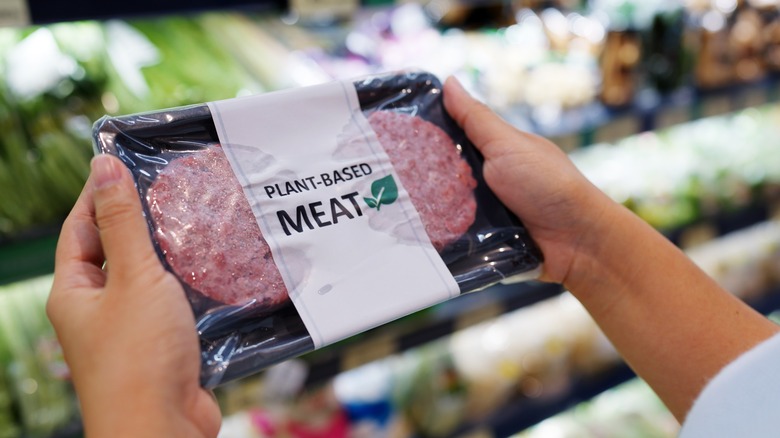Is Plant-Based Pork Good For You?
It's easier than ever to reduce meat consumption, regardless of the motivation to do so. Whether you're concerned about animal welfare, your health, or global sustainability, switching to a plant-based diet has many benefits. The MD Anderson Cancer Center points out that adopting a diet that emphasizes vegetables, fruits, whole grains, and beans and seeds, while cutting back on animal-based products, is a great way to minimize your risk for developing diseases like heart conditions and diabetes as well as reduce inflammation in the body and give your immune system a boost.
If you're concerned that moving away from a meat-focused diet means giving up the taste you love, you can rest assured that this is no longer an issue. Companies like Impossible Foods and Beyond Meat have created meat substitutes designed to mimic the taste, appearance, and texture of many meat products, including beef, chicken, sausages, and meatballs.
Impossible Foods' original product, called the Impossible Burger, boasts a lower ecological footprint than meat cultivated from cows, using 75% less water and releasing 87% less greenhouse gas emissions than the real deal. They've also discovered ways to use plant extracts to closely resemble the taste of beef, fine-tuning the formula in a lab setting.
One of Impossible Foods' most recent launches was its plant-based pork, which debuted at the Momofuku Ssäm Bar in Manhattan, New York in the fall of 2021. But is it actually a healthy alternative to pork from pigs? Here's what we know.
Plant-based pork has a favorable nutritional profile
When compared to pig-based pork, Impossible Foods' plant-based pork appears to be more nutritious with fewer calories and less fat (including the more harmful saturated fat). The company states that when compared with a serving of 70/30 ground pork, their plant-based pork has 37% fewer calories and 59% less fat with no cholesterol whatsoever.
The plant-based pork also boasts a profile of vitamins and minerals, including B vitamins in addition to zinc and niacin. If that wasn't enough, Impossible Foods doesn't use any hormones or antibiotics, which are often given to factory-farmed pigs during their lifetimes and might pose a risk to human health when ingested, according to The Healthy Fish.
In general, plant-based fake meats can be considered relatively healthy as they contain fiber, iron, and lower quantities of saturated fat when compared to real meat, according to HealthDay News. The downside is they don't often measure up to the amount of protein found in real meat and typically contain excess salt, which isn't great for those needing to reduce their sodium intake.
Not to mention that they are processed foods. Clinical nutritionist Samantha Heller told the outlet that while "whole foods are best," plant-based meats can be eaten in moderation without a problem. "All in all, eating more plants and fewer animals is good for your health and the health of the planet," she stated.


